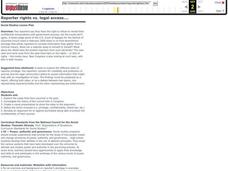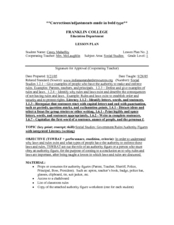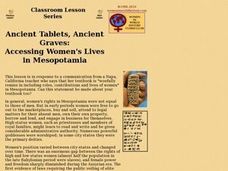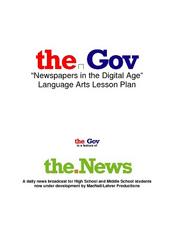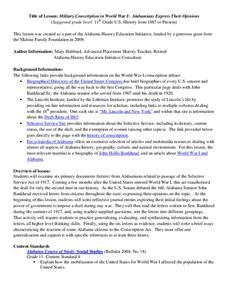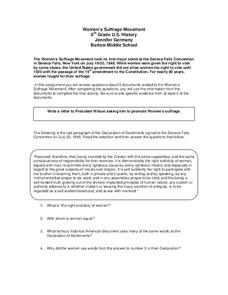Media Smarts
Hoax? Scholarly Research? Personal Opinion?
Divide your class into groups to study the validity of online sources. One group looks at the authority and accuracy of four listed websites, another group looks at advocacy and objectivity, and the third group looks at currency and...
National Endowment for the Humanities
Lesson 4 James Madison: Internal Improvements Balancing Act—Federal/State and Executive/Legislative
Who has the power? The founding fathers asked the same question when the United States was formed. Learners explore issues that arose during Madison’s presidency that raised constitutional questions. Through discovery, discussion, and...
National Endowment for the Humanities
Lesson 2 James Madison: The Second National Bank—Powers Not Specified in the Constitution
How much power is too much power for the federal government? Scholars use primary documents and constitutional research in groups to analyze the creation of the Second National Bank under James Madison. This is the second lesson of a...
National Endowment for the Humanities
The War in the South, 1778–1781
The second in a three-part look at the Revolutionary War focuses the years from 1778 through 1781 and zooms in on military operations in the southern colonies, the French alliance, and the role African-Americans played in events. Class...
PBS
African American History: Climbing the Wall
Imagine the challenge of trying to trace your family genealogy if no records were kept of births and deaths. Where would you look for information? What types of documents could provide you with the information you seek? History...
Curated OER
Research and Documentation
Did you just assign a research project to your high school class? Begin the research process with this presentation. Give your class ideas about where to find information, how to evaluate sources, and how to properly cite them. The...
Curated OER
Reporter Rights vs. Legal Access...
Students explore cases that have occurred in the past in which reporters refuse to reveal their confidential conversations with government sources and investigate the status of the current bills in Congress. Students use this information...
Humanities Texas
Primary Source Worksheet: Thomas Jefferson, Confidential Message to Congress Concerning Western Exploration and Relations with the Indians
A confidential message written by Thomas Jefferson provides readers with an opportunity to practice their reading comprehension skills. The resource, part of a series, includes questions that require a close reading of the message and a...
Curated OER
Transcription of Lord Dunmore’s Proclamation
For this primary source analysis worksheet, high schoolers read Lord Dunmore's Proclamation and discuss its historical significance.
Curated OER
Seeking a Fortune in 18th Century Maritime Boston
Study the Revolutionary War era practice of recruiting seamen to prey upon the British shipping industry, and discuss the impact this practice had on the Colonial war efforts. Learners read and interpret recruiting advertisements for...
Curated OER
Laws and Rules
First graders participate in a role play about laws and rules where they portray an authority figure, or portray someone who has to obey the law. In this sociology and law lesson plan, 1st graders discuss the purpose of laws and rules....
Curated OER
A New Era for Palestinians
Get a global perspective and examine the challenges facing Mahmoud Abbas, the newly elected president of the Palestinian Authority. Thoughtful classroom citizens write letters to Mr. Abbas, asking him questions and suggesting advice....
Curated OER
Understanding Points of View
Investigate the importance of author's point of view. Young linguists study primary source documents related to the Treaty of Casco Bay. The first source is authored by the Native American Chiefs, the second by an English...
Curated OER
A Problem with Authority?
Students consider the prospect of inviting a controversial leader to speak in their community. They analyze the Iranian president Mahmoud Ahmadinejad's controversial invitation to speak at Columbia University. Students create...
Curated OER
Ancient Tablets, Ancient Graves: Accessing Women's Lives in Mesopotamia
High schoolers explore the role of women in ancient Mesopotamia. Several excerpts from the Mesopotamian cuneiform tablets and artifacts are analyzed to determine the treatment, rights, and powers of women in this era.
Curated OER
The Underground Railroad as an Act of Civil Disobedience
Pupils write an essay from rough draft to final copy about the Underground Railroad. Civil disobedience is researched from a variety of sources. There is a prewriting exercise that is included in the lesson. The whole writing process is...
Curated OER
The True Confessions of Charlotte Doyle: KWHL
After completing the 11th chapter of The True Confessions of Charlotte Doyle by Avi, take part in a KWHL chart driven by the question,When is it appropriate and admirable to defy authority? Focusing on codes of conduct, scholars...
Curated OER
Pioneering Principles: Why Character Matters
What does it mean to "be of good character"? What are the qualities that define such a person? The 1825 Colonization Law of Coahuila y Texas required that all new immigrants into Mexican Texas present documentation that they were of good...
US National Archives
The Royal Seal What Can It Tell Us?
Analyze the images and details of the Great Seal of Queen Elizabeth I, and discover clues that reveal how one of the greatest monarchs in the history of England wished to be seen and respected. This is a great way to discuss how even to...
Curated OER
Running for Freedom: The FUgitive Slave law and the Coming of the Civil War
In order to understand the complicated nature of slave laws during the Civil War, learners compare and contrast an abolitionist poster and a runaway slave ad. They use an attached worksheet to consider each primary source document, then...
Curated OER
Newspapers in the Digital Age
Is journalism more or less reliable with the influx of Internet sources? Learners investigate the issues of freedom of speech, journalistic ethics, and social responsibility in the age of Twitter and Facebook. After examining the...
Alabama Department of Archives and History
Military Conscription in World War I: Alabamians Express Their Opinions
If called, would you go? Should the US government have the power to impose a draft during any war? The Selective Service Act of 1917 (aka the Conscription Act of 1917) authorized the drafting of men into the military for only the second...
Curated OER
Women’s Suffrage Movement
Though the movement for Women's Suffrage stretched over several decades and across two centuries, the final few years were the most difficult hurdle in many ways. Use a document-based question writing exercise to make inferences about...
Constitutional Rights Foundation
Puritan Massachusetts: Theocracy or Democracy?
Was Puritan society governed as more of a theocracy or democracy? After comparing and contrasting a series of primary source documents, middle and high schoolers form small groups and debate the question.








